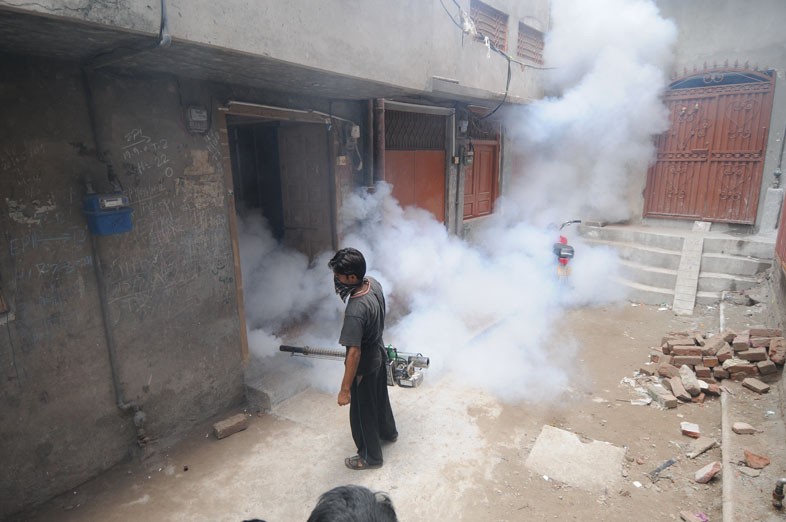
This year marks the most serious outbreak of dengue since 2011. Karachi, Rawalpindi and Islamabad are the most adversely impacted areas

Syed Ali Abbas, 23, a university student who lives in Islamabad, has been getting treatment for dengue fever at his home for the past one week. He could not get admitted to a public hospital because they are already full, of dengue patients. This year, the epidemic has impacted the twin cities of Rawalpindi and Islamabad severely.
"We went to the hospital immediately after we identified dengue symptoms but there was no place to stand even, because of an extraordinarily large number of dengue patients," his father Manzoor Ali Shah tells The News on Sunday. Scores of people are being refused treatment in public hospitals because of lack of space these days, he adds.
"On average, we are getting 120 patients a day. We are trying our best to treat all patients, and those who are not in a serious condition, we give them prescriptions to follow at home," Dr Muhammad Nasir of Holy Family Hospital in Rawalpindi says. The situation at Polyclinic Hospital in Islamabad is similar, according to a paramedic of the health facility in the capital city.
Mosquito-borne dengue virus has affected a large number of people across the country this year. This year is seen as the worst after the 2011 outbreak. Karachi, Rawalpindi and Islamabad are believed to be the worst impacted areas this time.
According to the figures released by Dr Zafar Mirza on September 25, the number of registered dengue patients in the country now stands at around 13,000. Out of the total, 2,500 patients are from the Punjab; 2,258 from Sindh; 2,000 from KP; and 2,000 from Balochistan. He also announced urgent arrangements regarding dengue fever outbreak response and coordination among the Centre and the provinces.
Mirza expects that during the next month, with the mercury dropping, the disease will be under control. Of the dengue fever patients in the Punjab, 70 percent were reported from the Potohar region (Rawalpindi division). "95 per cent of the cases in Sindh were reported from Karachi and 84 per cent of the cases in the Punjab from Rawalpindi," he says. He vowed to run a massive fumigation campaign to eradicate dengue mosquito larva at the earliest in these two severely impacted cities.
"The government has not taken care this season. There was no fumigation campaign in public places or a proper awareness campaign. There is also no surveillance mechanism for homes," says Shah, who is seriously concerned for the recovery of his young son.
"Unfortunately, this government has paid more attention to tax reforms and collecting revenue and no value is given to the issues pertaining to public health," he laments. He says there were no arrangements to deal with this threat during the breeding season even in the capital city.
Last week, Punjab Chief Minister Usman Buzdar, visited Rawalpindi to oversee the measures being taken to eradicate dengue virus and to inquire after patients in public hospitals. He also announced the recruitment of as many as 1,000 doctors, and medical and paramedical staff on an urgent basis to overcome shortage of staff in anti-dengue campaign, particularly, in the affected region.
"Actually, this peak in dengue virus is being witnessed after every four years. It was witnessed in 2011 and then in 2015-2016 and now we have seen this in 2019," the executive district officer (Health) of Rawalpindi region tells TNS.
"However, we must also admit that there has been less effort to ensure surveillance this year. Previously, there have been seasonal campaigns and surveillance teams to make people aware and be more careful about noting symptoms of dengue fever. Unfortunately, this year the surveillance was not of that quality somehow," he adds.
"The outbreak is feared to peak till or mid-November until the temperature at nights fall below 15 degree Celsius," the EDO cautions. He says that a lot of patients in Rawalpindi public hospitals are coming from Islamabad as well. There have been 11 deaths reported in this region (which includes Islamabad) due to dengue fever in the past few days.
Dengue has emerged as a global life-threatening public health concern, affecting around 2.5 billion individuals in more than 100 countries. The World Health Organization has reported that dengue cases have increased from 2.2 million in 2010 to over 3.34 million in 2016. In Pakistan, dengue emerged as a social problem in 2010. The biggest outbreak in the country was witnessed in 2011.